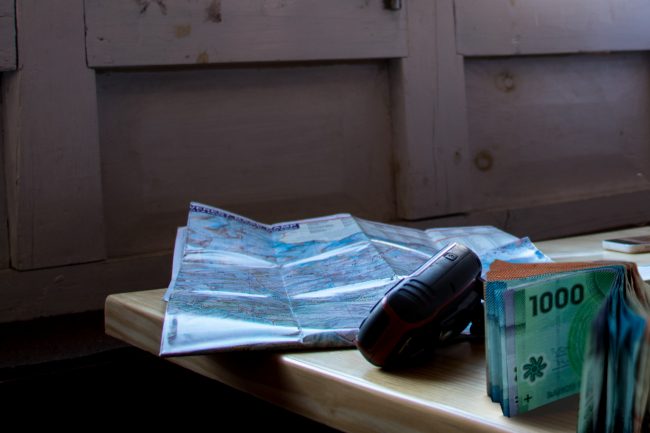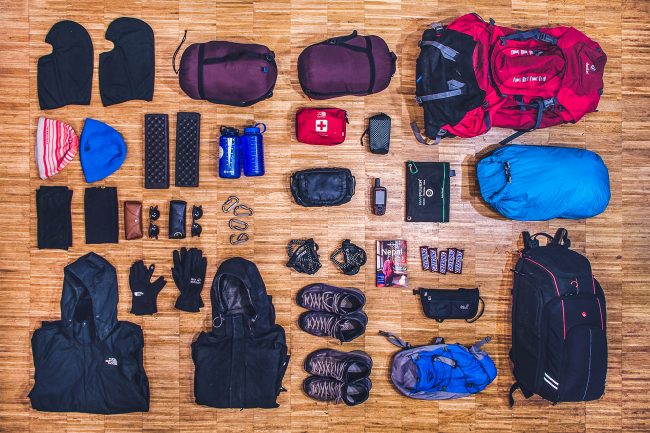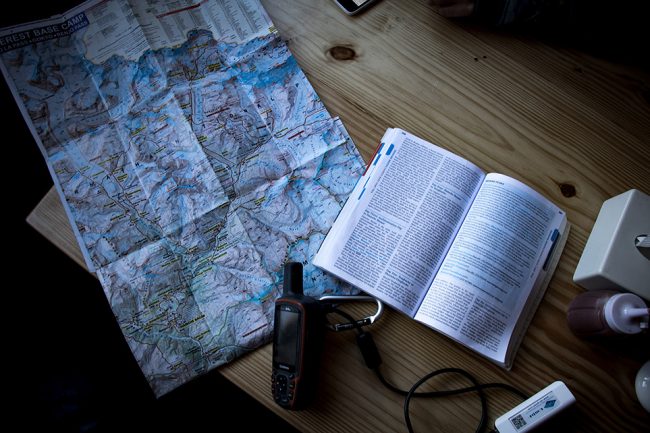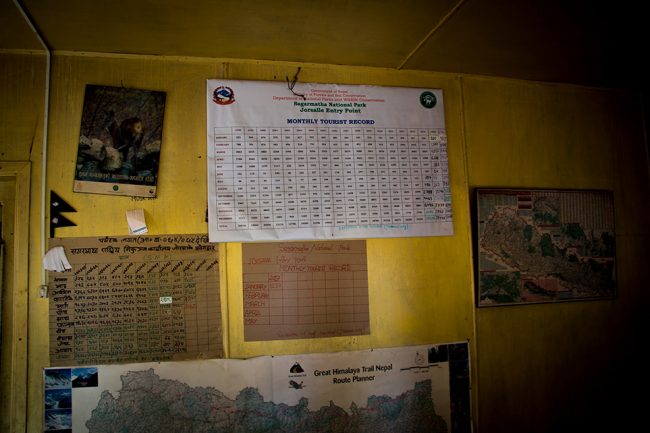Everest Base Camp Trek on a Budget
To explore the highest trek in the world can be rather inexpensive. After the upfront costs of trekking equipment, flights, and park permits, it’s surprisingly cheap to hike the Everest Base Camp Trek independently.

How expensive is the Everest Base Camp Trek?
Total money spent per person: $597
Duration: 12 days
Prices listed below are for one person, including round-trip airfare from Kathmandu to Lukla, permits, food, accommodation, toiletries, medicine, other miscellaneous; not including the cost of gear and insurance.
Transportation: $314
Yeti airlines round-trip flights from Kathmandu to Lukla
We took a flight from Kathmandu to the Tenzing–Hillary Airport. It’s your best option to maximise your time on the trek. During high season up to 75 flights land on the »world’s most dangerous airport«. Let me tell you; it’s quite the flight! Its runway is only 1,729 ft long (with a 12% gradient) and abruptly drops off to a 9,200ft cliff edge. Flights are often canceled due to bad visibility, so give yourself a few buffer days. You have to confirm your return flight at the counter in Lukla the day before, there you can change them to an earlier outbound flight aswell. Be there before 4 pm!
We bought our tickets online.

Permits: $54
Entry fee to the Sagarmatha National Park: $34
TIMS Card (Trekkers’ Information Management Systems): $20
These permits are required, and you have to show them at multiple checkpoints throughout the trek. You can get them at the Nepal Tourism Board office in Kathmandu. Office Hours are from 10 am to 5 pm. It’s also possible to purchase the permits on the trek, in Monjo: the TIMS Card office is at the beginning of the village, you can’t miss it, as it is a checkpoint. There you have to provide your health insurance details and will need a passport photo to buy the card. You can purchase the Nation Park permit at the entrance of the Sagarmatha National Park.

Accommodation: $23
Teahouses usually offer incredibly cheap accommodation in the form of basic, wooden rooms, typically around $2-3 per night, but you can also find some free of charge. Most places require that you eat at their restaurant. If you eat elsewhere, they charge additional costs. Few places offer private rooms with an attached bathroom. We spent two nights (in Phakding and Lukla) in »luxury« rooms with a private bathroom (10$/night) and still, on average, paid less than $2 per person per night.

Food & Drinks: $168
Lodges are offering a variety of pancakes, noodles, potatoes, rice, and vegetables, ranging from $3 to $7. A cup of tea starts at 80 ¢.
We spent around $14 per day per person.

Miscellaneous: $38
Toiletries, medicines (there is a pharmacy in Namche), snacks, toilet paper, and other miscellaneous expenses added up to a total of $78. (Spent money on a good lip balm with SPF!) We only paid for one battery recharge of our DSLR ($2,90) and never paid for Wi-Fi. Budget more money if you plan on using Wi-Fi, charging batteries or taking a shower.

Reduce expenses
Skip flights
If you have enough time and force, you can trek in and out from Shivalaya, just past Jiri. This way extends the outward and return journey by six days. You will have the trek mostly to yourself and can acclimatize slowly. We didn’t trek to Lukla ourselves but met a few that did, with mixed opinions.
Trek independently
Trekking independently is the greatest cost saver. To pay a guide/porter fairly, you should calculate 25$/15$ per day. We had a lengthy discussion about this topic beforehand. Even though we love to hike on our own, and would always prefer to do so, we initially felt guilty of not supporting a guide and/or porter and their families – especially at a time when they try to rebuild after being hit by a devastating earthquake. Since we were on a budget, it came down to going to Nepal or not; and that decision was easy. We happily trekked, with a clear conscience, while supporting the people along the way.
Use water purification tablets
As you’ll need 4-5 liters of water per day, water purification tablets are a safe way of being sure you have plenty of drinking water that won’t cause you to become sick. Without an independent way to purify your water, you’ll be blowing a lot of money for refills or plastic water bottles, while creating unnecessary waste in the process. We’ve been using them for years and highly recommend.
Buy snacks ahead
Buy your snacks in Kathmandu or bring them from home for more variety. Since prices in the Khumbu region can easily increase sixfold, it is worth to carry the amount of extra weight.
Bring your power
One thing that I always carry with a smile on my face is my solar panel. While hiking it is continuously attached to my Garmin GPS, whose battery life isn’t long-lasting. With two outlets our RAVpower is great to charge our cell phones and GoPro simultaneously. Electricity on the trek is mainly from solar power as well, therefore relies on having sunny weather. It costs from 2 to $3 per hour/full charge. Bring an additional power bank to recharge batteries overnight (or if it’s cloudy during daytime). We love our Anker power bank!
Get Data SIM Card
If you need to be connected, teahouses provide Wi-Fi for a surcharge of around $5 an hour. Consider buying a prepaid Data SIM Card. Ncell offers a high-speed 3G internet service for the Everest region, but reception isn’t always great. SIM cards are cheap and available in many stores in Kathmandu. Bring your passport, as all SIM cards are registered.
Bring baby wipes
When it comes to hygiene, baby wipes have a great chance to become your best friends. You might belong to the lucky and/or brave ones that actually take a shower or have a hot bucket (3 to $5). For us, that wasn’t the case. There was no running water above Namche, and it was just too cold even to consider. It was a small celebration every time we got the wipes out.

Bottom Line
The round trip flight from Kathmandu to Lukla has a whopping price tag, but the hike to Everest Base Camp itself is surprisingly cheap! Even though we never watched what we were spending, had a thoroughly good time and booked two nights in »luxury« rooms, we averaged just under $50 a day. Considering we only spent 12 days in the Everest region and the flights, which have the biggest price tag are already included, this is a great price to cross something big off your bucket list.
Total Budget for Everest Base Camp Trek
Transportation: $314
Permits: $54
Accommodation: $23
Food & Drinks: $168
Miscellaneous: $38
—-
$597
Leave a Reply!
Leave a Reply
2 Comments
Leave a Reply
More Tips for the EBC trek







I like more to make a trekking experience. I am love it, pls intimate me every trekking schedule to my email or my what’s app – 9487354867
Hi Dhanasekar
Thank you we will add you for sure. We are in Nepal at the moment and finished the Annapurna Circuit, Annapurna Base Camp and a small trip to Poon Hill.
Can’t wait to start editing our videos and webpage.
Thanks Jan